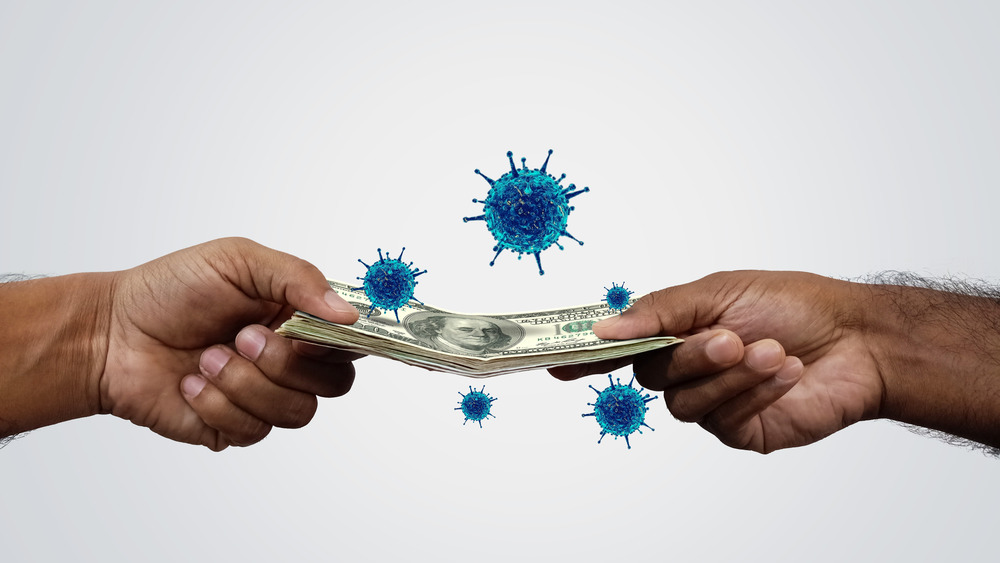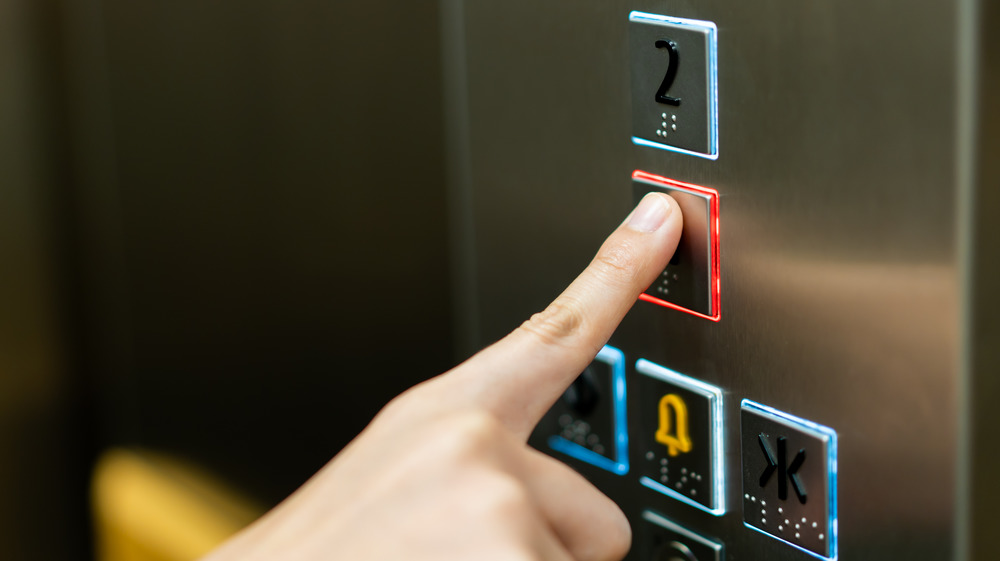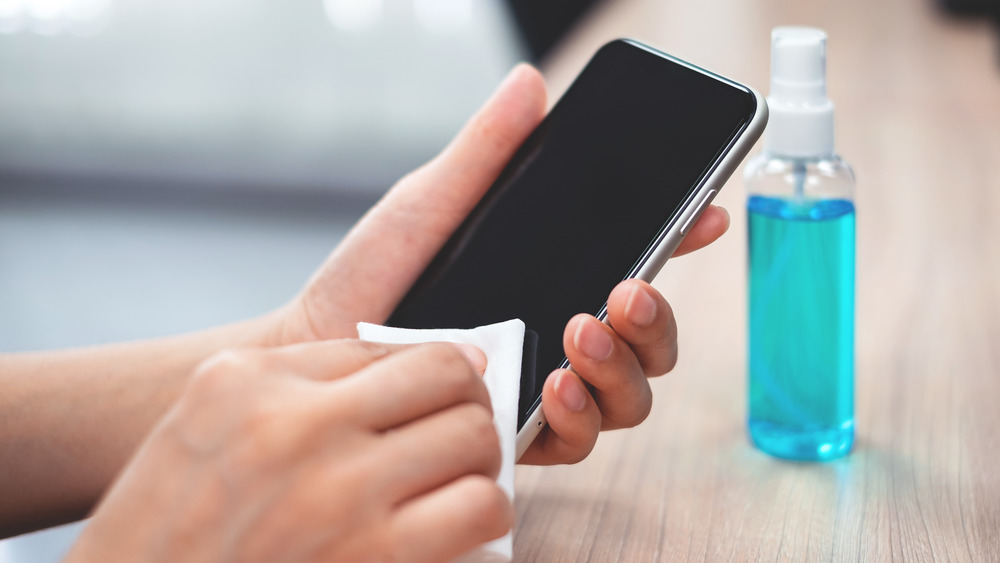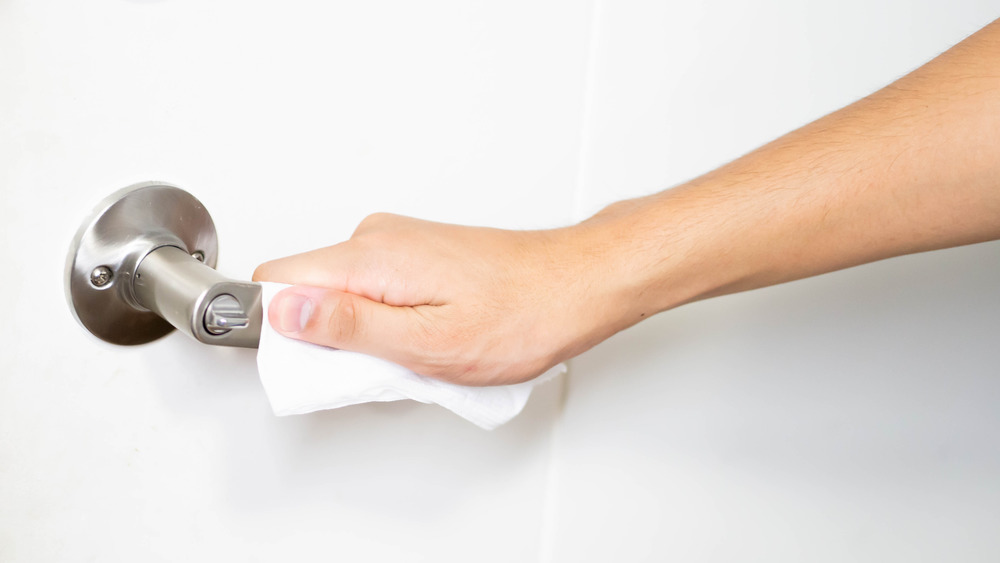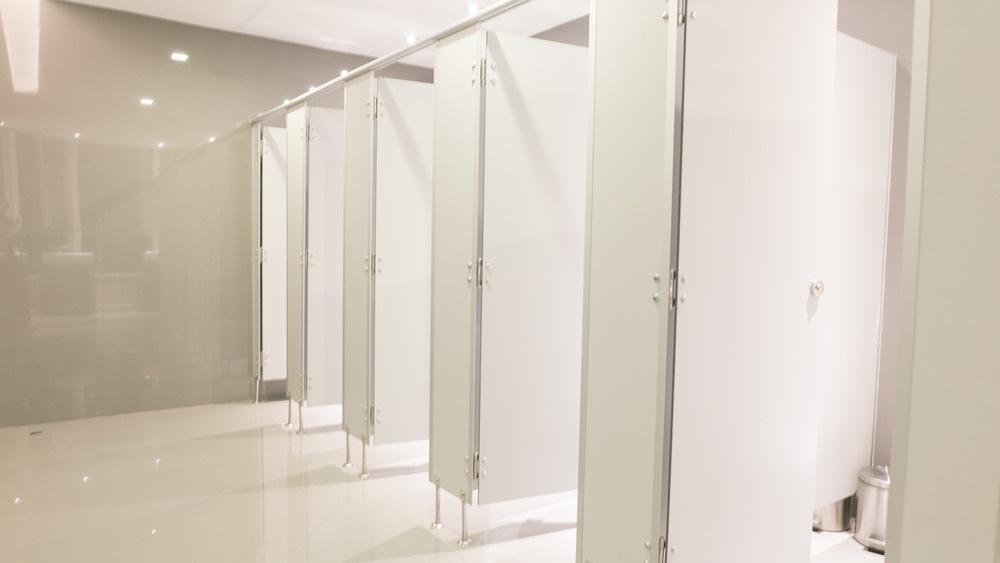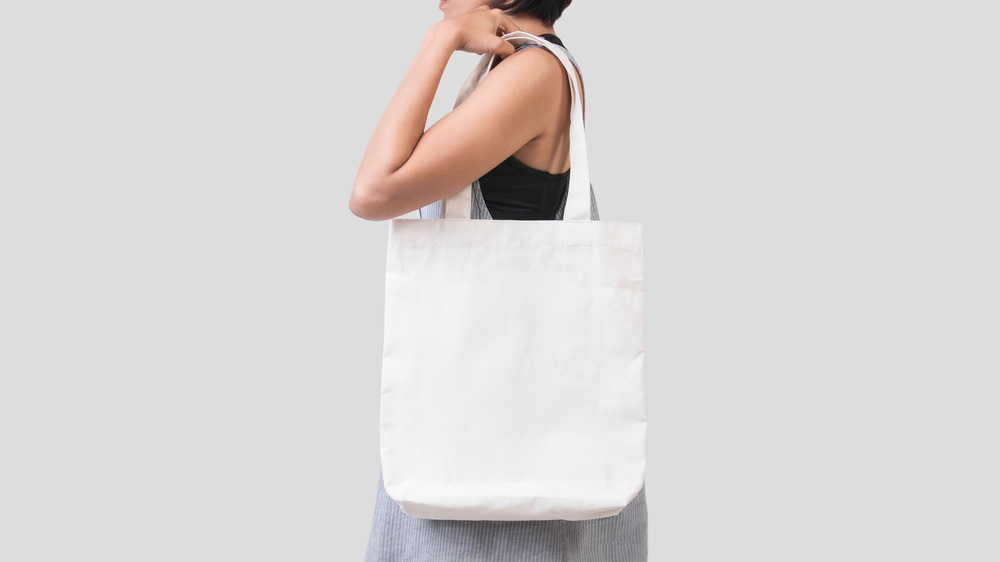Things You Touch Every Day That Have More Germs Than You Realized
The world is a germy, dirty place — bacteria are everywhere. Yes, we are surrounded by millions of microorganisms — and that's mostly okay. As noted by Harvard Women's Health Watch, many types of microbes are beneficial. In fact, some bacteria and germs that live on your body can actually help you be healthier, happier, and more balanced. Furthermore, as explained by WebMD, exposure to some germs can ultimately help boost immunity. Living in a completely sterile environment is not only counterproductive to one's well-being, it's flat-out unrealistic.
Of course, there are plenty of not-so-great germs that you should try to avoid — the ones that seemingly exist just to knock us down and get us sick. And while you may be aware of many common sources of germs, you're probably living in the dark about many others. You can't live in a bubble (though you might want to after seeing this!), but we do want to help prepare you for what you face, er, touch while out and about.
Without further ado, read on to learn more about the things you come into contact with every day that have more germs than you realized — plus tips to mitigate your risk of illness (Spoiler: Wash your hands).
Shopping carts carry your groceries and lots of germs
Shopping at the supermarket should be a fairly low-stress activity. But when you really stop to think about all the germs you come into contact while browsing fresh produce, canned goods, and pantry essentials, well, it's enough to make your stomach turn and your appetite plummet (though we guess that's one way to keep those grocery bills down).
Yes, there are a plethora of especially icky microbe-infested surfaces at your local food shop. The absolute worst offender? Your grocery cart — as if the inevitable squeaky wheel wasn't bad enough, right? According to a study by ReuseThisBag.com, a typical cart has approximately 361 times the amount of germs as a bathroom doorknob. In an interview with Today, Dr. Charles Gerba, a microbiology professor, advised utilizing those nifty disinfecting wipes at the entrance of the store (or bring your own), and swipe the handle before using. What's more, if you're putting a child in the built-in seat, clean that as well.
And while you may save time using a self-checkout touch screen, you're not saving yourself from germs. Gerba told Today that "there are actually more antibiotic–resistant bacteria on these screens than in a hospital."
Money is majorly disgusting
Ready to put your money where your mouth is? Well, scratch that plan and keep those filthy dollar bills far from your face. In fact, next time you handle money, consider washing your hands — like posthaste.
It's no surprise to hear that money is chock full of all sorts of pathogens, germs, and mystery contaminants. One study, published in Future Microbiology, found that money can be a more dangerous disease spreader when handled at restaurants and hospitals. Salmonella, E. coli, influenza, norovirus, rotavirus, and hepatitis A were just a few samples identified on sample bills and coins.
As noted by Scientific American, it, of course, makes sense that money would be a likely vehicle for infection. It gets passed from hand to hand, store to store, person to person, and takes on a life of its own. In fact, per Federal Reserve data, a dollar generally remains within circulation for approximately 6.6 years, while a $100 bill could be in use for up to almost 23 years (via U.S. Currency Education Program).
You may just want to sanitize after pulling money out of the ATM as well. Those machines have also been found to harbor fungus, food remnants, and other general funk, according to WebMD.
Elevator buttons are super icky
Have you ever seen someone hit the elevator button with their elbow? It may look funny, but these germ-avoiders truly get the last laugh. It is simply about minimizing hand contact.
While your apartment building or office skyscraper's elevator might be gross, it is probably not as bad (or dangerous) as those located in a hospital, where secondary infections are a common occurrence. A study published in Open Medicine found that the buttons on hospital elevators host an abundance of bacteria, most notably staphylococci and streptococcus. Disturbingly, the research indicated that hospital elevator buttons colonize more pathogens than toilet seats. Of course, as hand hygiene is a top priority in most medical settings, a simple squirt of sanitizer or thorough soap-up session can negate the potential transmission of disease.
FYI: Taking the stairs won't necessarily spare you exposure to germs either — unless you go completely hands-free. Stair and escalator railings are also high-touch items that harbor bacteria, per Time.
Playgrounds are jumping with germs
If you have kids, you know that they want to try every playground they come across. The more slides, swings, and adventurous structures the better. They see an opportunity for boundless fun, but you may recognize it as a veritable breeding ground for germs and disease.
A study by HomeAdvisor found that of the most common playground equipment, "rock walls, baby swings, and seesaws were by far the germiest: All three teemed with over 52,000 times more bacteria than a typical home toilet seat." Surprisingly, the monkey bars boasted significantly fewer germs. And, interestingly, indoor playgrounds were found to harbor fewer colonies of pathogens than their outdoor counterparts — most likely as a result of frequent cleaning and disinfection.
If you think the sandbox would be a better bet for germ-free play, think again. Wild animals can "leave behind fecal matter... which may cause stomach illnesses and skin infections in young kids," according to Parents.
Your cell phone is crawling with grossness
Ring ring. It's your immune system calling with a fair warning: Your cell phone is full of filth. A study published in Germs found that a typical cell phone has 17,032 bacterial rRNA gene copies (aka a plethora of pathogens) at the ready to meet your hands or cheek. Why? Emily Martin, an epidemiology professor at the University of Michigan, explained to Time, saying, "Because people are always carrying their cell phones even in situations where they would normally wash their hands before doing anything, cell phones do tend to get pretty gross."
Wiping down your mobile and being mindful of where you take it (and set it down) can help mitigate the risk spreading disease. Yes, that means you should avoid using your phone while you, um, sit on the toilet to do your business. "Taking a cell phone into the bathroom and then leaving with it is kind of like going in, not washing your hands and then coming back out. It's the same level of concern," Martin told Time.
The gas pump is pretty nasty
When you stop to fuel up, you could be exposing yourself to a whole lot more than just gasoline fumes. As noted by Real Simple, hundreds — if not thousands — of people come into contact with the handle of a gas pump on a regular basis. What's more, research cited by the magazine showed that "the button for regular, unleaded gas" ranks as the germiest item at the gas station with a staggering 3.2 million colony forming units (CFU).
You are not even free of germs in your own space as the interior of your car probably is not much cleaner. Research by CarRentals.com found that the steering wheel, interior door handle, cup holder, seat belt, and gear shift are among the grossest items in your vehicle; there are typically about 700 strains of bacteria in any given vehicle. Of course, this nastiness makes sense considering that 32 percent of people admit to only cleaning their car interior annually.
So how can you avoid the ick? Deep cleanse your car, sanitize your hands, and, if possible, wear rubber gloves when pumping gas, as recommended by Real Simple.
Restaurant menus and communal condiments are filthy
Going out to eat can help you take a load off. You can wine and dine without having to spend hours in the kitchen. Ah. But before you get too cozy at the table for two, consider wiping down the surface you are about to eat on.
Research cited by WebMD noted that in addition to potential germs on your table, those plastic restaurant menus are crawling with cooties. More specifically, they have been proven to harbor E. coli and staph. Table condiments are another common source of pathogens at restaurants. What's worse? Even your drink is not safe from germs. Studies have found that ice and lemon wedges carry certain types of bacteria (via WebMD). Fortunately, your stomach acid should be able to "neutralize" this threat. However, you might want to exercise extra caution when ordering beverages if you have a compromised immune system. And while you are at it, consider completely skipping the salad bar and buffet — ew!
Use caution when opening doors and touching doorknobs
You are in and out and all over the place — running errands, heading to the office, stopping home, and then dashing out the door again. One thing to think about as your feet pound the pavement and you head from spot to spot: all the things your hands have touched, and how you have most likely come into contact with tons of door-knob and door-handle germs.
In fact, one study found that a virus similar to the norovirus (hello, stomach flu!) can spread to approximately 50 percent of coworkers in an office setting in just two to four hours' time, thanks to dirty, germ-infested door knobs and other commonly touched surfaces like light switches, communal conference phones, and shared tables (via CBS News). Study author Charles Gerba noted that, thankfully, you can prevent getting ill by disinfecting commonly touched surfaces. And don't forget to frequently wash your hands with soap and water.
Public restrooms (obviously) have a plethora of nasties
No one really wants to use a public restroom or, worse, a portable potty. But sometimes nature calls at the most inconvenient moments, and you've got to do what you've got to do. To this end, you might want to stash some extra baby wipes, hand sanitizer, seat covers, and even some TP in your car or bag. When you're squatting over a gas station toilet seat, you will be thankful you did.
Public health expert Carol A. Winner told Health, "A public bathroom is a petri dish." According to the Mayo Clinic, bacteria and viruses can live on hard surfaces for hours, making a public bathroom a common source of infection. What's more, as noted by MIT Health, there's the real concern of potential viral spread through toilet plume. In short, when someone flushes the toilet with the seat cover lifted, tiny particles are expelled into the air and onto surfaces.
So what should you do when you have to use the loo? As advised in Health, cover your hands when making contact with surfaces, wash those paws thoroughly, and use a paper towel to dry them.
Your handbag is fabulous, but festering with germs
Your bag holds all of your coveted treasures. It also holds lots of things you don't even want to know about. So next time you walk into your house after running errands, think twice before you plop your purse or laptop bag on the dining room table, your bed, or anywhere else. That arm candy is actually pretty foul.
One study found that a typical handbag can have 10,000 different types of bacteria (via Metro). Of course, when you stop to think about the last time you actually cleaned your bag, this startling number starts to make more sense. Your bag contains everything but the kitchen sink: dollar bills, coins, makeup, food scraps, and more. You take it with you everywhere you go — including public restrooms — and put it on all sorts of surfaces. And unfortunately, your gorgeous leather bag tends to hold more germs than bags made of other less porous materials.
This is why it's important to be mindful with your favorite accessory. For starters, hang your bag on a hook rather than putting it on the floor in public places. While you're at it, wash your hands before digging around in your Gucci, Metro advised.
Stay away from water fountains
Feeling parched? From now on you might want to consider packing your own water bottle.
A 13-year old boy famously used his school's water fountains as the subject of his science project, and discovered — much to the shock and alarm of teachers, staff, and administrators — that the institution's H20 supply was loaded with bacteria (via ABC News). If that does not quite illustrate the grossness, take note of this tidbit: In a study performed by The Toronto Star, a random dog's water bowl outside of a Starbucks coffeeshop was found to harbor significantly fewer germs than most water fountains found in public spaces.
Nevertheless, we suggest you steer clear of the canine slobber and the water fountain. But if you need to drink from a public water fountain, avoid touching the spout with your mouth. And if you accidentally grace it with a lip, try not to fret. As noted in the "Ask Well" column of The New York Times, the spout is perpetually being rinsed off. The bowl under some water fountains is the part you truly want to avoid, as it can be contaminated with germy mucus.
Beware of germs when taking public transportation
Planes, trains, or automobiles — whatever your mode of transportation, if it involves lots of people, it also involves lots of germs. Indeed, if you ride the commuter rail, the subway, trolley, or bus, you are getting more than you bargained for; vehicles of public transportation are notoriously filthy.
A lot of this concern stems from the potential for surfaces to harbor pathogens. Dr. Shilpi Argawal, a board-certified family physician, explained to Health that many viruses remain alive for up to a few hours on things like seats, arm rests, and table trays. What's more, she noted, "In an airplane, train or bus, the flu is particularly easy to spread because you are in such close proximity to others, so you're more likely to come across [infection-causing] droplets." She continued, saying, ""Especially on a plane, the dry air from the altitude reduces our body's natural immune defenses, making it easier for the virus to enter the body."
Since many people use public transportation to get to and from their place of work, microbiology professor Charles Gerbahard advises people to stay home if you are not feeling well to help prevent the spread of germs (via Health). What's more, hand washing is always key (have we mentioned that yet?).
Gym equipment is germ ridden
You know that people sweat when using the communal equipment at your local gym, but when you press the treadmill touchscreen, or lift a 3-pound dumbbell, you are coming into contact with way more than some harmless perspiration.
In fact, a study by Fit Rated found that approximately 70 percent of the bacteria at the gym can cause illness or be potentially dangerous to fitness enthusiasts. Some of the yuck discovered included gram-positive cocci, gram-negative rods, and Bacillus. What does this mean? Well, if you find yourself with a skin infection, pneumonia, or even sepsis, your gym could be to blame. According to the study, stationary bikes, free weights, and treadmills were all found to boast over 1 million colony forming units (CPU) per square inch. The next time you hit the gym for a workout, do not forget to wipe down the equipment before and after you get your sweat on.


